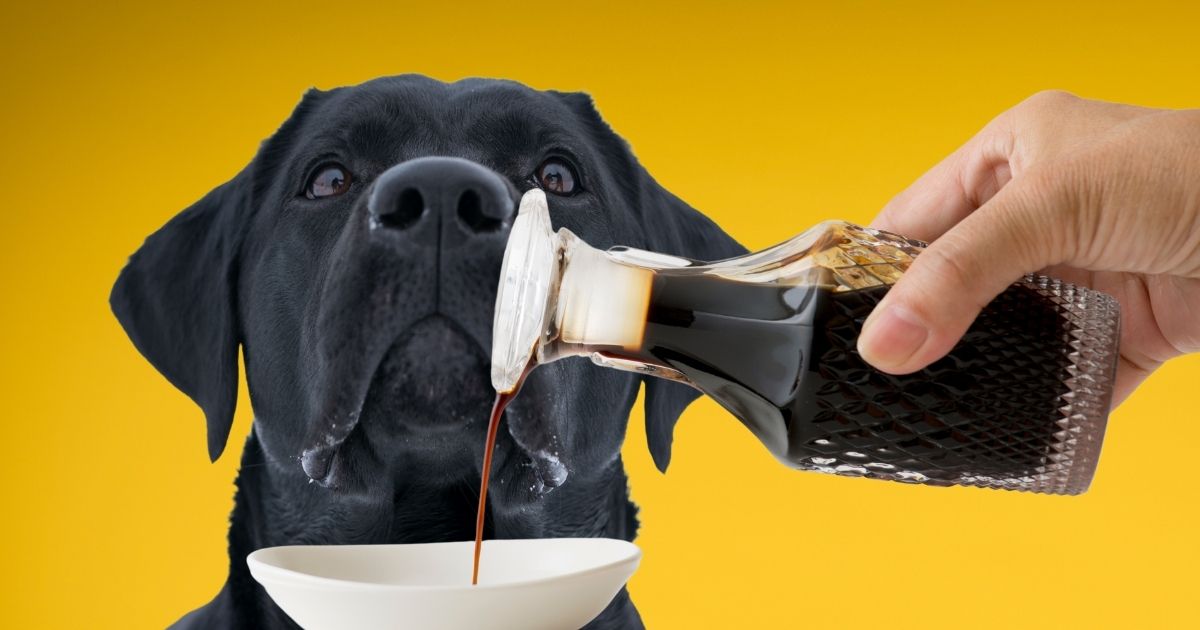Pet dogs are an essential part of the family; hence, dog parents treat them equally as family members.
Sometimes these include taking their pets along on family vacations, holiday celebrations, and even sharing treats and food with them.
However, as a responsible dog parent, there is a line you should not cross when it comes to sharing treats or human food with dogs as they have a different digestive system, and thus, different dietary needs.
So, can dogs eat soy sauce? Where should dog owners draw the line regarding feeding soy sauce to their pooch?
Let’s dig in to find out the answers.
What is Soy Sauce?
Soy sauce is a salty liquid condiment traditionally made by fermenting soybeans, brine, roasted grain, and wheat.
This liquid condiment originates from China and has existed for about 2,200 years.
Soy sauce spreads through East and Southeast Asia, where it is used in cooking and as a condiment.
It first broke into Europe through the Japanese and Dutch trading in 1600, and its first production in the US began in 1908 in the territory of Hawaii.
The basic ingredients in soy sauce are soybeans, salt, wheat, and fermenting agents such as yeast or mold.
However, regional soy sauce varieties include varying amounts of ingredients resulting in different flavors and colors of soy sauce.
Can Dogs Eat Soy Sauce?

Dogs cannot eat soy sauce not because of its soy content but rather because of its high concentration of sodium content.
A dog ingesting too much sodium will undoubtedly result in health complications, neurological concerns, or even death.
If you suspect your dog of eating soy sauce or any food containing a severe amount of sodium, ensuring your dog drinks enough water is the first thing you ought to do.
Soy in itself is not toxic or poisonous to dogs; in fact, soy has many benefits to dogs.
A study report by veterinary nutritionist Cailin Heinze of Tufts University Cummings School of Veterinary Medicine destroys the myth that soy is bad for dogs.
In her report, Dr. Heinze explains a number of benefits of soy to dogs, including it being a suitable food ingredient for dogs with liver shunt and helpful in treating canine food allergies.
You may wonder — if soy is not bad for dogs, what makes soy sauce toxic to dogs?
Soy sauce is unhealthy for dogs primarily because of its other ingredients.
It isn’t just soy itself but soy with a blend of salt and other unhealthy food ingredients for dogs.
Below is the nutrient profile of 16g of Soy Sauce
| Nutritional Info | Amount |
|---|---|
| Calories | 8.5 |
| Fat | 0.1g |
| Sodium | 879mg |
| Potassium | 70mg |
| Carbohydrates | 0.8g |
| Fiber | 0.1g |
| Sugars | 0.1g |
| Protein | 1.3g |
| Calcium | 0.4% |
| Iron | 1.3% |
From the nutrient chart above, the high amount of sodium present in soy sauce is evident.
This alone makes it not the best treat to feed your dogs.
Is Soy Sauce Bad for Dogs?
Soy is not bad for dogs; however, soy sauce results from other unhealthy ingredients it contains, which can negatively impact a dog’s health.
Explained below are these harmful ingredients and their impact on dogs.
There’s Too Much Sodium
A moderate amount of sodium is healthy for dogs.
Notwithstanding, it is necessary to know that dogs have an extremely low tolerance for sodium; hence, can only consume a small quantity of it in their daily diet.
Ideally, a dog should not consume more than 100mg of sodium daily, but soy sauce contains more than triple that amount in just a single tablespoon.
Excessive sodium intake in dogs will result in salt poisoning.
Some of the common symptoms of salt poisoning are limping, decreased appetite, lethargy, disorientation, seizures, excessive thirst for water, weakness.
A severe case of salt poisoning in dogs can lead to death.
Kidney disease is also another negative effect of excessive sodium intake in dogs.
Symptoms of kidney disease are similar to that of salt poisoning, except for other symptoms such as blood in urine and an ulcer in the mouth.
Some Brands Contain Garlic or Onions
There are several brands of soy sauce in the market. A few of this brand incorporate garlic and onions among its many ingredients to make it taste better.
Unfortunately, garlic and onions are toxic to dogs in large amounts.
They can cause diarrhea, abdominal pain, intolerance to exercise, excessive drooling, organ failure, heart damage, anemia, and in severe cases, even death.
Sometimes symptoms of onion and garlic poisoning take days to manifest in dogs.
Hence, this makes feeding soy sauce to dogs an unhealthy risk.
Dog parents should abstain from feeding soy sauce to their dogs, and if they must keep soy sauce at home for their personal consumption, they should ensure to keep it in places out of their pet pooch’s reach.
How Much Salt is Unhealthy for Dogs?
As much as sodium can be harmful to dogs, a moderate amount of sodium is also essential in a dog’s diet.
So what exactly is a moderate amount of sodium to dogs?
Moderate means balance; for instance, a dog weighing 33 lb should not eat more than 100 mg of sodium daily.
However, this varies depending on your dog’s age, size, and other health conditions.
It would be best to consult your vet to help you decide on the amount of salt intake you can feed to your dog and its overall diet.
What About Other Soy Foods?

Seeing as soy sauce is not a healthy food to feed your dog, you may wonder: what about other soy foods? Are they also detrimental to a dog’s health?
As noted earlier, soy isn’t toxic to dogs; still, let’s find out.
Soy milk
Most dogs are lactose intolerant; hence they can’t eat milk as this may unsettle their stomachs.
However, soy milk is different. Soy milk is free of lactose and safe for dogs consumption.
Still, you should feed your dog sparingly as soy milk contains a high amount of calories which can result in unhealthy weight gain when excessively fed.
Soybeans
Soybeans are safe for dogs to eat. In contrast to soy sauce, soybeans contain a moderate amount of sodium, plus it is rich in protein, fiber, calcium, and magnesium, thus, making it a healthy meal for your furry friend.
As long as your dog is not allergic to soybeans, you can feed it.
Tofu
Tofu also is safe for dogs consumption as long as you feed in moderation. Tofu is rich in protein and can substitute as healthy dog treats to feed your dog.
What Should I Do If My Dog Ate Soy Sauce?

If you suspect that your dog has eaten soy sauce, the first thing you should do is determine the amount of soy sauce your dog must have consumed.
The lesser the quantity consumed, the better.
However, if your dog consumes a small quantity, it would become thirsty and urinate more frequently.
This is a good thing, and you should provide your dog with plenty of water to drink as water helps dissolve the excess sodium in your dog’s body, and urine flushes it out of the system.
Most times, if your dog has consumed little amount of sodium or soy sauce, chances are it won’t result in anything serious.
If your dog has consumed an excessive amount of sodium in soy sauce, keep an eye on your dog for any oddity or the symptoms mentioned in the previous section.
If you notice any symptoms, take your dog to the vet without delay.
Can dogs eat oyster sauce?
Yes, dogs can eat oyster sauce. Oysters are a great source of protein, essential minerals such as zinc, iron, and Omega-3 fatty acids, which are all beneficial to a dog’s health.
However, ensure you prepare the oyster sauce in a way that is safe for your dog to eat, i.e., without the addition of spices and salt.
Can dogs eat food with soy sauce?
Even a tablespoon of soy sauce is enough to send a dog to the vet. Giving a dog food with soy sauce is bad enough because of the high amount of sodium present in it.
Can dogs eat seasoning?
While spices generally are not good for dogs consumption, a few natural spices and herb are, in fact, beneficial to a dog’s health.
Examples of spices and natural herbs you can give your dogs include ginger, cinnamon, turmeric.
What kind of sauces can dogs have?
Adding unsalted broths and gravy to your dog’s dry kibbles can make it extra tasty for them.
Avoid them if they have extra additives like salt, onions, garlic, or other ingredients that are toxic for canines.
Related:
Best Bone Broth For Dogs (Top 10 & Why They’re Good)
The Bottom Line: Can Dogs Have Soy Sauce?
The short and safest answer is no! Dogs should eat soy sauce.
As we have seen in this article, soy sauce contains several ingredients that are detrimental to a dog’s health.
As loving dog parents, you do not want to jeopardize your dog’s health by feeding it unhealthy meals.
So, it is wise to abstain from soy sauce and rather opt for other soy food safe for your pooch’s consumption.







